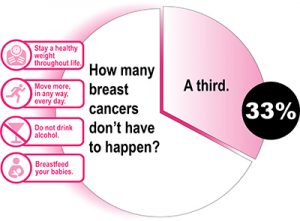 For years, we’ve heard a lot about the heart health benefits of the Mediterranean Diet. Now an analysis from a randomized trial suggests this diet, supplemented with extra-virgin olive oil and nuts, may help lower risk of breast cancer.
For years, we’ve heard a lot about the heart health benefits of the Mediterranean Diet. Now an analysis from a randomized trial suggests this diet, supplemented with extra-virgin olive oil and nuts, may help lower risk of breast cancer.
The analysis, published in the Journal of the American Medical Association, is from the PREDIMED trial – a 6 year study that includes data from over 4000 women, 60-80 years old and at high risk for cardiovascular disease. The women had been assigned to follow one of three diets, a Mediterranean diet where they received extra virgin olive oil, a Mediterranean diet with provided mixed nuts, or they were advised to follow a low fat diet. The women had quarterly sessions with a dietitian to assess how well they were following the diet.
At the end of the study, the women following the Mediterranean diet with olive oil showed a 62% lower risk of malignant breast cancer than the control, low fat diet group. When researchers put the olive oil and nuts groups together, there was a 51% relative risk reduction compared to the control group.
A Mediterranean diet plate contains plenty of legumes, nuts, grains, vegetables and fruits with olive oil providing most fat. This traditional diet from Greece and southern Italy also includes fish, moderate amounts of poultry and dairy, just small amounts of red and processed meats and moderate alcohol with meals. Eating a diet with mostly plant foods is linked with lower cancer risk and is one of AICR’s recommendations for cancer prevention.
In this study the addition of extra virgin olive oil may contribute to lower cancer risk, the authors say, due to some of olive oil’s active compounds like polyphenols or oleic acid.
The authors’ caution that this a secondary analysis – the primary purpose of PREDIMED was to study the Mediterranean diet’s effect on cardiovascular disease. In addition the number of breast cancer cases was small — 35 women — and because the women were at high risk for cardiovascular disease, these results may not apply to all women.
In the meantime, we know there are evidence-based steps women can take to lower risk of postmenopausal breast cancer: stay a healthy weight, be physically active at least 30 minutes every day and don’t drink alcohol. And there are lots of reasons to follow a diet  with plenty of plant foods, including to help you get to and stay a healthy weight. Learn how to do that with our free online New American Plate Challenge. We’re only in week two – ten more weeks to go – so you can still sign up!
with plenty of plant foods, including to help you get to and stay a healthy weight. Learn how to do that with our free online New American Plate Challenge. We’re only in week two – ten more weeks to go – so you can still sign up!
The supplemental foods used in the study were donated by Patrimonio Comunal Olivarero and Hojiblanca, Spain (EVOO); the California Walnut Commission, Sacramento, California (walnuts); and Borges SA (almonds) and La Morella Nuts (hazelnuts), both from Reus, Spain. Study authors have also received research funding from these groups.






I was confused as to why the group that had all the extra EVOO had less breast cancer than the group give extra nuts. Any thoughts?
What needs to be addressed regarding the Mediterranean diet is whether is has benefit because of or in spite of olive oil and fish. Colin Campbell of The China Study thinks it has benefit in spite of the oil. Campbell has noted that cancer rates for regions of the Med. diet are well above those of rural China that he studied 35 years ago in his book. Dr. John McDougal opposes both oil and fish so notes the benefits of the Med. diet from grains and fruits and vegetables, not oil and fish. Caldwell Esselstyn likewise says “no oil”.
Good Point! Either way I counsel patients on eating a healthy plant based diet.
It is my understanding from further reading referring to this trial, that the “low fat” group wasn’t really low in fat at all. It was basically a pretty standard, relatively poor diet. Does any one know how the participants actually ate?
Thank you!
Ms. Bettis, I believe some of the drs. I mentioned above discuss this study on their websites. Try John McDougals first. Also, on Dr. Micheal Greger’s amazing website, nutritionfacts.com, I think he directly discusses this study on a 5 minute or so video and also has other short videos on the Mediterranean diet as well (try right around “page” 8 i think for the videos.)
There is no precise definition of the “Meditteranean Diet”.
The fat content will vary primarily based upon how much oil (olive, etc.) and fish is used. Regardless, there is quite a bit more fat in the Med diet than what Campbell, et all, call the WFPBD, Whole Food Plant Based Diet which use essentially no animal foods, fish or otherwise, or oils.